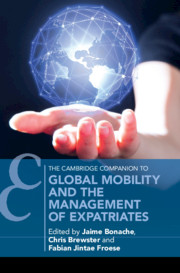Book contents
- Global Mobility and the Management of Expatriates
- Cambridge Companions to Management
- Global Mobility and the Management of Expatriates
- Copyright page
- Contents
- Figures
- Tables
- Contributors
- 1 Global Mobility
- Part I The Expatriation Process of Corporate Expatriates
- 2 The Recruitment, Selection, and Preparation of Expatriates
- 3 Expatriate Adjustment
- 4 Performance Management for Expatriates
- 5 Compensating Global Mobility
- 6 Repatriation and Career Development
- Part II Different Types of Expatriates and Stakeholders
- Index
- References
4 - Performance Management for Expatriates
from Part I - The Expatriation Process of Corporate Expatriates
Published online by Cambridge University Press: 12 November 2020
- Global Mobility and the Management of Expatriates
- Cambridge Companions to Management
- Global Mobility and the Management of Expatriates
- Copyright page
- Contents
- Figures
- Tables
- Contributors
- 1 Global Mobility
- Part I The Expatriation Process of Corporate Expatriates
- 2 The Recruitment, Selection, and Preparation of Expatriates
- 3 Expatriate Adjustment
- 4 Performance Management for Expatriates
- 5 Compensating Global Mobility
- 6 Repatriation and Career Development
- Part II Different Types of Expatriates and Stakeholders
- Index
- References
Summary
In order for an employee to help the organization achieve strategic success through his or her performance, he/she must work at optimal levels towards very clear and specific objectives. In other words, the organization must design and implement a performance management system (PMS) that empowers employees and allows them to work at optimal levels. However, a review of the related research shows but when it comes to expatriates, most organisations do not develop dedicated PMSs – instead, it seems that most organizations evaluate and manage expatriates on an ad-hoc basis, often leading to dissatisfaction with the outcomes and conduct of the PMS, and subsequent dip in performance levels and quality. In this chapter, we briefly trace the history of PMSs, with particular emphasis to PMSs related to expatriates, and discuss some recent PMS models. We further discuss additional contextual variables that should be incorporated into effective PMSs, and conclude by offering guidelines for designing an effective PMS for expatriates.
Keywords
- Type
- Chapter
- Information
- Global Mobility and the Management of Expatriates , pp. 80 - 99Publisher: Cambridge University PressPrint publication year: 2020



